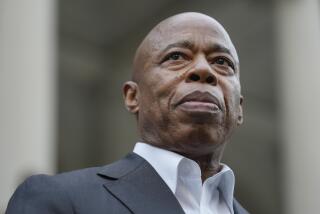Ex-Starr Aide’s Story Kept Changing, Prosecution Charges
- Share via
WASHINGTON — A former top aide to Kenneth W. Starr, the former Whitewater independent counsel, told an ever-changing story to federal investigators last year about whether he had leaked sensitive information about a possible prosecution of President Clinton, a Justice Department prosecutor charged Thursday.
However, attorneys for the defendant, Charles G. Bakaly III, said that the thrust of his statements never changed, even though he added more details over a period of weeks.
As his trial opened in federal court, Bakaly, 44, a former Los Angeles lawyer, is not charged directly with leaking information. Rather, he stands accused of lying about his actions in a written declaration in February 1999 to Chief U.S. District Judge Norma Holloway Johnson, who had supervisory authority over Starr’s grand jury.
Bakaly initially denied that he was responsible in any way for a Jan. 31, 1999, New York Times story. But he later acknowledged that he had several conversations with and provided guidance and a key internal office memorandum to a journalist who reported that Starr believed he had the constitutional authority to indict Clinton while he still was president.
The story, appearing on the eve of Clinton’s Senate impeachment trial, enraged the president’s attorneys, who charged that Starr’s office had leaked secret grand jury information in an effort to influence the Senate trial.
The story reported that some attorneys in Starr’s office wanted to indict Clinton for perjury and obstruction of justice in the Monica S. Lewinsky investigation, the same charges on which the Senate voted to acquit the president.
First Amendment lawyers said they believe that Bakaly’s case represents the first criminal charges to result from a leak investigation in Washington since the prosecution of former Pentagon official Daniel Ellsberg in the early 1970s. But the charges against Ellsberg, who had leaked the so-called Pentagon Papers to the New York Times, ultimately were dismissed.
Most leak investigations fail to pinpoint the leaker because reporters refuse to identify their sources. However, Bakaly was immediately put under suspicion because he acknowledged to Starr that he had spoken with Don Van Natta Jr., the New York Times reporter. Bakaly, however, insisted that he had not provided anything more than what Van Natta had already learned from former Starr aides no longer working in the office and that he had tried to steer the reporter to write an article that would protect the office.
And Bakaly was firm on a principal issue involved: He had not shared any secret grand jury information, a point the Justice Department has not contradicted.
Donald T. Bucklin, an attorney hired by Starr to investigate the leak, testified Thursday that “Mr. Bakaly indicated he hadn’t been a source” for the story. Based on Bakaly’s assurances, Bucklin said, he submitted a formal declaration of denial to Judge Johnson in response to White House demands that Starr’s office be held in contempt for leaking confidential data.
Under cross-examination, however, Bucklin said that he did not include in the declaration some later qualifications that Bakaly suggested to disclose the extent of his contacts with the reporter. Later, after FBI officials had questioned Bakaly over several weeks, Bucklin realized that his original declaration about Bakaly’s flat denial was untruthful and he had the document withdrawn.
On the basis of that document, Bakaly is being prosecuted for contempt of court. If convicted by Johnson in the nonjury trial, he could receive up to six months in prison and possibly be disbarred. His trial is expected to last two to three days.
John Griffith, the chief prosecutor, told the court that Bakaly “made false statements and representations in an effort to conceal his involvement.” Griffith said that the office of independent counsel had relied on them.
The prosecutor added that Bakaly later “admitted he had not been fully truthful in his earlier interviews.” The former Starr aide offered “changing statements” in nearly every FBI interview, at one point saying that “he feared he would be disbarred and possibly prosecuted,” Griffith told the court.
Bucklin testified that Starr had nothing to do with the newspaper story and was especially upset at a meeting the following day because “it would be perceived by many that the independent counsel was interjecting himself” in the Senate trial.
Defense attorney Robert M. Weinberg sought to show that a careful parsing of Bakaly’s declaration demonstrates that it was oversimplified by Bucklin and omitted some qualifications suggested by Bakaly. Weinberg noted, however, that “nowhere in the document does it say that Mr. Bakaly did not give any information” to the newspaper.
Weinberg insisted that the declaration can be read as technically truthful in every aspect.
*
Times staff writer Ronald J. Ostrow contributed to this story.
More to Read
Get the L.A. Times Politics newsletter
Deeply reported insights into legislation, politics and policy from Sacramento, Washington and beyond. In your inbox twice per week.
You may occasionally receive promotional content from the Los Angeles Times.










